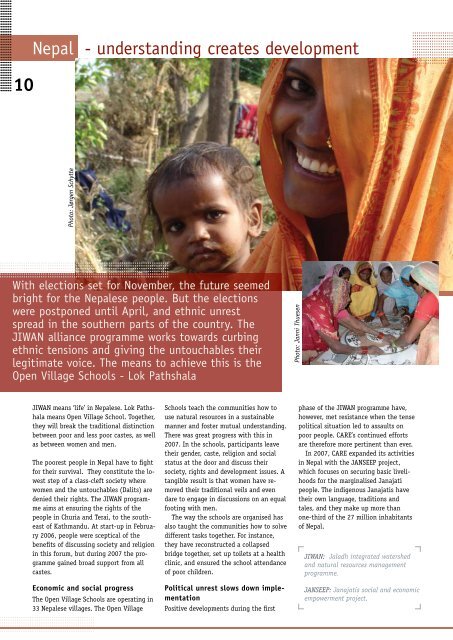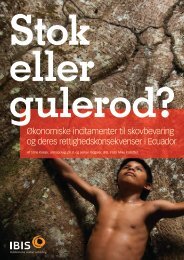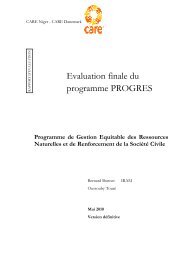You also want an ePaper? Increase the reach of your titles
YUMPU automatically turns print PDFs into web optimized ePapers that Google loves.
10<br />
Nepal - understanding creates development<br />
Photo: Jørgen Schytte<br />
With elections set for November, the future seemed<br />
bright for the Nepalese people. but the elections<br />
were postponed until April, and ethnic unrest<br />
spread in the southern parts of the country. The<br />
JIWAN alliance programme works towards curbing<br />
ethnic tensions and giving the untouchables their<br />
legitimate voice. The means to achieve this is the<br />
Open Village Schools - lok Pathshala<br />
JIWAN means ‘life’ in Nepalese. Lok Pathshala<br />
means Open Village School. Together,<br />
they will break the traditional distinction<br />
between poor and less poor castes, as well<br />
as between women and men.<br />
The poorest people in Nepal have to fight<br />
for their survival. They constitute the lowest<br />
step of a class-cleft society where<br />
women and the untouchables (Dalits) are<br />
denied their rights. The JIWAN programme<br />
aims at ensuring the rights of the<br />
people in Churia and Terai, to the southeast<br />
of Kathmandu. At start-up in February<br />
2006, people were sceptical of the<br />
benefits of discussing society and religion<br />
in this forum, but during 2007 the programme<br />
gained broad support from all<br />
castes.<br />
Economic and social progress<br />
The Open Village Schools are operating in<br />
33 Nepalese villages. The Open Village<br />
Schools teach the communities how to<br />
use natural resources in a sustainable<br />
manner and foster mutual understanding.<br />
There was great progress with this in<br />
2007. In the schools, participants leave<br />
their gender, caste, religion and social<br />
status at the door and discuss their<br />
society, rights and development issues. A<br />
tangible result is that women have re-<br />
moved their traditional veils and even<br />
dare to engage in discussions on an equal<br />
footing with men.<br />
The way the schools are organised has<br />
also taught the communities how to solve<br />
different tasks together. For instance,<br />
they have reconstructed a collapsed<br />
bridge together, set up toilets at a health<br />
clinic, and ensured the school attendance<br />
of poor children.<br />
Political unrest slows down implementation<br />
Positive developments during the first<br />
Photo: Janni Thuesen<br />
phase of the JIWAN programme have,<br />
however, met resistance when the tense<br />
political situation led to assaults on<br />
poor people. <strong>CARE</strong>’s continued efforts<br />
are therefore more pertinent than ever.<br />
In 2007, <strong>CARE</strong> expanded its activities<br />
in Nepal with the JANSEEP project,<br />
which focuses on securing basic livelihoods<br />
for the marginalised Janajati<br />
people. The indigenous Janajatis have<br />
their own language, traditions and<br />
tales, and they make up more than<br />
one-third of the 27 million inhabitants<br />
of Nepal.<br />
JIWAN: Jaladh integrated watershed<br />
and natural resources management<br />
programme.<br />
JANSEEP: Janajatis social and economic<br />
empowerment project.






